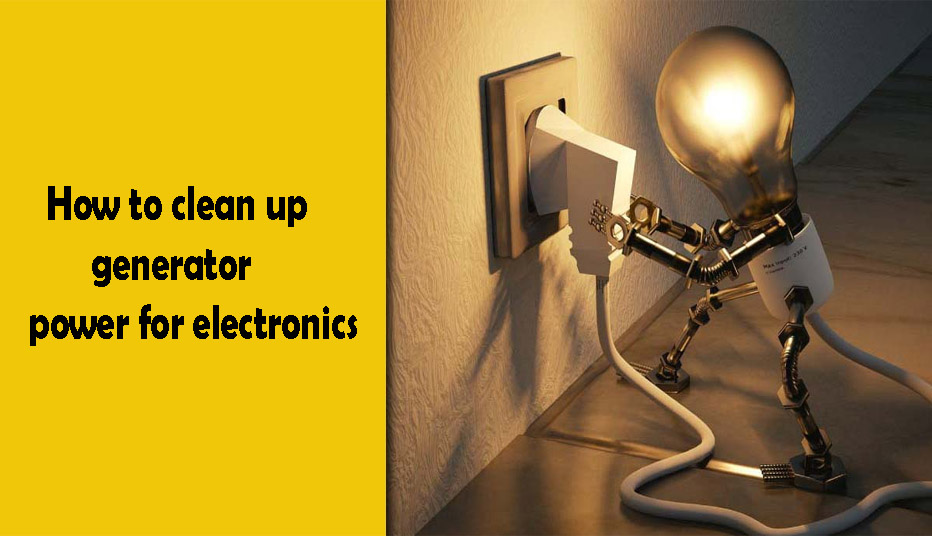Generators are a safe way to power your electronics when there is no electricity or when you are in a remote area. But the electricity they make isn’t always as clean and reliable as power from the grid. This could hurt your expensive tech gadgets. In this guide, we’ll look at how to clean up the power from a generator so that things stay safe and work.
How does Dirty Power work?
Power quality is very important in the world of electricity. But not all electricity is made the same. Step into the mysterious world of “Dirty Power.” It’s a term that might sound a little strange, but what it means is very important. It affects everything from the tools in our homes to the factories that keep our modern world running.
Dirty power is an electrical source that isn’t as good as it could be. Its waveform has irregularities, distortions, and other flaws. The power we get from our utility companies is clean and steady, but dirty power can have voltage spikes, surges, frequency changes, harmonics, and electrical noise. Even though these differences may not seem like a big deal, they can cause problems for sensitive electrical devices and systems, such as malfunctions, shorter lifespans, or even the loss of data.
In this look into dirty power, we’ll learn more about its sources, effects, and, most importantly, how to keep your electrical systems running easily by reducing its effects.
Figuring out the Problem
Before we talk about how to fix the problem, it’s important to know why generator power can be bad for electronics. Generator power is different from grid power in that the voltage and frequency can change. This can cause problems like voltage jumps and surges. Generators also make what is called “dirty power,” which is made up of things like harmonic distortion and electrical noise.
Electronics, especially sensitive ones like computers, smartphones, and home theater systems, are made to work with clean, stable power. Getting dirty or unreliable power can lead to a number of problems, such as:
- Shorter life: Your gadgets may not last as long if they are often exposed to power fluctuations.
- Data Loss: Computers and recording devices can lose or mess up their data when the power goes out unexpectedly.
- Less efficient: When running on dirty power, appliances like air conditioners and freezers may not work as well as they should.
Cleaner Ways to Make Generator Power
Now that we know what we’re up against, let’s look at some good ways to clean up generator power for your electronics:
- Use an automatic voltage regulator (Voltage Regulator or AVR)
Voltage regulators, also called automatic voltage regulators or AVRs, are devices that keep the voltage output fixed even if the voltage from the generator changes. These are important for computers and home theater systems, which have sensitive parts.
- Buy a “surge protector.”
Your first line of defense against voltage spikes is a surge blocker. Choose a surge protector with a high joule value to protect your electronics from sudden surges.
3. Think about getting a line conditioner
Line processors not only keep the voltage steady, but they also get rid of electrical noise and fix frequency changes. They are useful for recording and video equipment in particular.
- Use backup power supplies (UPS).
A UPS works as a buffer between the generator and your electronics. It gives you clean power and lets your gadgets work for a short time when the power goes out. This is very important for computers to keep from losing info.
- Getting a good start
Make sure your generator is properly grounded to cut down on the noise it makes. Also, use surge breakers that can connect to the ground.
- Keep up with repairs
Keep your engine in good condition. Power quality can be hurt by things like dirty fuel filters, old spark plugs, and other problems with servicing.
- Think about generators with Inverters
Inverter generators are known for making power that is better and more stable than regular generators. Even though they are more expensive, they are a great choice for gadgets that are sensitive.
- Get advice from a professional
Talk to an electrician or an expert if you’re not sure if your generator will work with your technology. They can help you choose the right tools and set up your system correctly.
Conclusion
When the power goes out or you’re in a remote area, a generator can be a lifesaver, but if it’s not used properly, it can damage your sensitive electronics. By buying the right tools, like voltage regulators, surge protectors, and line conditioners, and doing the right maintenance, you can make sure your gadgets get clean, stable power, which will make them last longer and work when you need them to. Even if the grid goes down, your expensive electronics will be safe and you will still have power.

